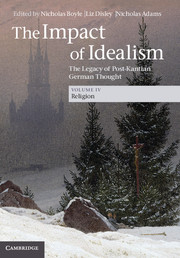Book contents
- Frontmatter
- Contents
- List of Contributors
- Acknowledgements
- List of Abbreviations
- Introduction: the impact of Idealism on religion
- 1 The impact of Idealism on Christology: from Hegel to Tillich
- 2 German Idealism's Trinitarian legacy: the nineteenth century
- 3 German Idealism's Trinitarian legacy: the twentieth century
- 4 Kierkegaard, Hegelianism and the theology of the paradox
- 5 Biblical hermeneutics: from Kant to Gadamer
- 6 Aesthetic Idealism and its relation to theological formation: reception and critique
- 7 The autonomy of theology and the impact of Idealism: from Hegel to radical orthodoxy
- 8 Faith and reason
- 9 Rabbinic Idealism and Kabbalistic realism: Jewish dimensions of Idealism and Idealist dimensions of Judaism
- 10 ‘In the arms of gods’: Schelling, Hegel and the problem of mythology
- 11 Dialectic and analogy: a theological legacy
- Bibliography
- Index
- References
8 - Faith and reason
Published online by Cambridge University Press: 05 December 2013
- Frontmatter
- Contents
- List of Contributors
- Acknowledgements
- List of Abbreviations
- Introduction: the impact of Idealism on religion
- 1 The impact of Idealism on Christology: from Hegel to Tillich
- 2 German Idealism's Trinitarian legacy: the nineteenth century
- 3 German Idealism's Trinitarian legacy: the twentieth century
- 4 Kierkegaard, Hegelianism and the theology of the paradox
- 5 Biblical hermeneutics: from Kant to Gadamer
- 6 Aesthetic Idealism and its relation to theological formation: reception and critique
- 7 The autonomy of theology and the impact of Idealism: from Hegel to radical orthodoxy
- 8 Faith and reason
- 9 Rabbinic Idealism and Kabbalistic realism: Jewish dimensions of Idealism and Idealist dimensions of Judaism
- 10 ‘In the arms of gods’: Schelling, Hegel and the problem of mythology
- 11 Dialectic and analogy: a theological legacy
- Bibliography
- Index
- References
Summary
This essay has as its focus Hegel's contribution to our contemporary thinking about the relation between theology and philosophy, through an engagement with two of his most fascinating discussions. The first is his account of ‘The Enlightenment struggle against superstition’ in the Phenomenology of Spirit; the second is his retrieval of Anselm's ontological argument in the Lectures on the Philosophy of Religion. This discussion exhibits in some ways a curious lack of impact of Idealism in contemporary thinking, in an area where Hegel has a distinctive and compelling – yet unfulfilled – contribution to make.
Discussions of ‘faith’ and ‘reason’ have two principal and rival ways of arranging their material: either historically or taxonomically. An historical account, looking at the Christian tradition, might discuss the relation between faith and reason in Augustine, Thomas, Descartes, Leibniz, Kant and Hegel, and then show how modern (especially Protestant) theological traditions take up these conceptions of the relation between faith and reason, including Luther, Calvin, Schleiermacher, Barth, ‘theology after Wittgenstein’, reformed epistemology, radical orthodoxy and so on. A taxonomical account might divide approaches into those that treat faith and reason as opposed, as hierarchically related, as complementary or as identical; it might look at topics such as proofs for the existence of God, philosophical defences of doctrinal claims, conceptions of the university disciplines of theology and of philosophy. Whether one takes the historical or the taxonomical route some account will be needed of how terms such as fides, ratio, intellectio, Glaube, Vernunft, Verstand, faith, reason, understanding are handled in the various thinkers, texts or forms of thinking under consideration.
- Type
- Chapter
- Information
- The Impact of IdealismThe Legacy of Post-Kantian German Thought, pp. 194 - 218Publisher: Cambridge University PressPrint publication year: 2013



